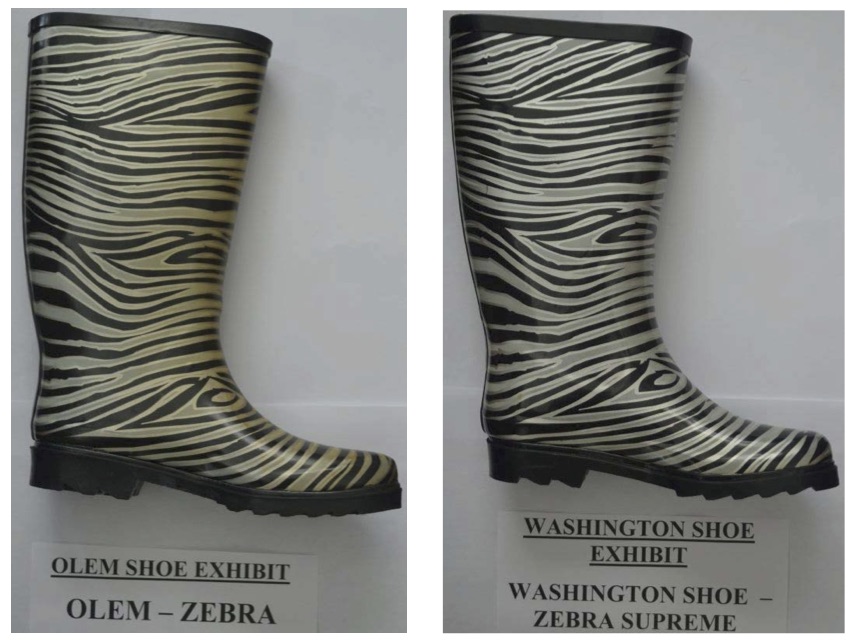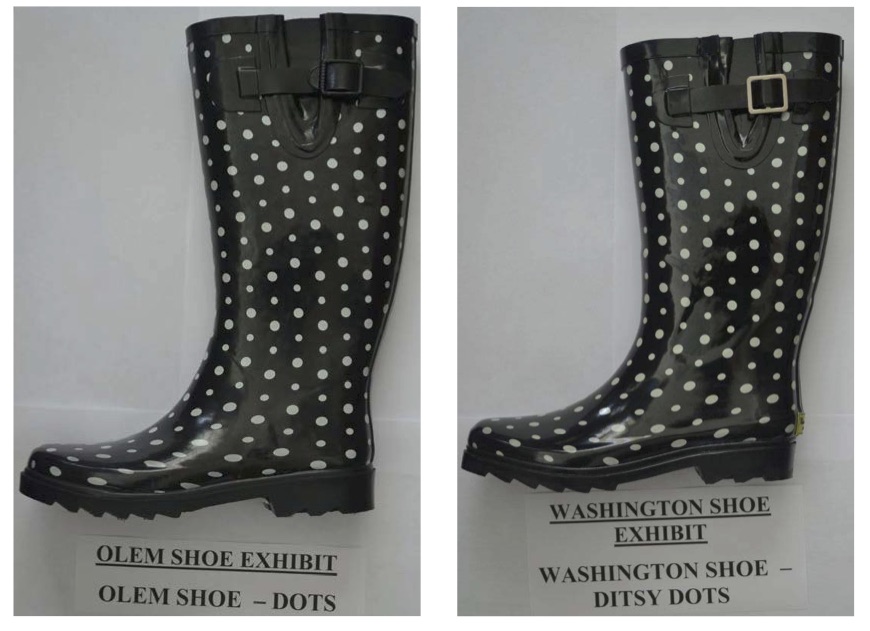Earlier this year, the 11th Circuit recently affirmed that Olem Shoe Corporation had infringed copyrights belonging to Washington Shoe by making nearly identical rain boot designs. Although it found that the infringement was not done “willfully,” what is significant about the case is that it established a new standard for determining willfulness in the 11th Circuit. The case is Olem Shoe Corp. v. Washington Shoe Corp., 591 Fed. Appx. 873 (11th Cir. 2015).
What’s the big deal about whether infringement is “willful”?
In copyright infringement actions, a plaintiff can sue for either “actual” or “statutory” damages. However, where the copyright owner elects statutory damages, the question of “willfulness” plays a big part as to the amount of those damages.
Normally, a copyright owner can sue for a sum of anywhere from $750 to $30,000 for an infringement. However, where the court finds that infringement was committed “willfully,” the Court may increase the award of statutory damages to a sum up to $150,000. 17 U.S.C. § 504(c).
Olem Shoe’s Well-Copied Wellies
Washington Shoe designs women’s rain boots with snazzy prints including the black-and-white “Zebra Supreme” and polka-dotted “Ditsy Dots,” both at issue in this case. In late-2009 or early 2010, Washington Shoe sent Olem cease-and-desist letters that featured pictures of the allegedly infringing boot patterns and argued that Olem was infringing Washington Shoe’s copyright designs. However, Washington Shoe did not include copyright registration numbers for those designs in the letters.
Olem promptly asked Washington Shoe for more information about the alleged copyrights, including the registration numbers. Washington Shoe gave a registration number for Ditsy Dots but not for Zebra Supreme. While continuing to research the registration, Olem canceled orders of both designs and stopped selling the boots.
Eventually, Olem sought a declaratory judgment of non-infringement. Washington Shoe filed a counterclaim for infringement.
Olem’s designs were ‘Strikingly Similar’
“A finding of copyright infringement requires proof of ‘(1) ownership of a valid copyright, and (2) copying of constituent elements of the work that are original.’” Olem Shoe Corp., 591 Fed. Appx. at 881 (citing Baby Buddies, Inc. v. Toys “R ” Us, Inc., 611 F.3d 1308, 1315 (11th Cir.2010) (quoting Feist Publ’ns, Inc. v. Rural Tel. Serv. Co., 499 U.S. 340, 361, 111 S.Ct. 1282, 1296, 113 L.Ed.2d 358 (1991)).
Both the Southern District of Florida and the 11th Circuit concluded that Olem infringed Washington Shoe’s copyrights. Upon examination of the images below, you might say that the boots were “strikingly similar.” That’s what the Court found also.
“Striking similarity exists where the proof of similarity in appearance is ‘so striking that the possibilities of independent creation, coincidence and prior common source are, as a practical matter, precluded.’”Id. at 885. (citations omitted). “Where two works are ‘essentially’ or ‘virtually identical,’ they are strikingly similar and, thus, the copying element is satisfied.” Id.
What Constitutes Willfulness in Copyright Infringement?
Despite that infringement occurred, both the Southern District and 11th Circuit agreed that the infringement was not done “willfully,” as Washington Shoe had alleged.
On one hand, “willfully,” in the context of copyright infringement, means that a defendant “knows his actions constitute an infringement.” (citing Cable/Home Commc’n Corp. v. Network Prods., Inc., 902 F.2d 829, 851 (11th Cir. 1990)).
However, in addition to willful infringement established through such knowledge, the 11th Circuit established a new standard, borrowed from patent infringement law, that relates more to recklessness than pure knowledge. That standard requires the copyright owner to show (1) “that the infringer acted despite an objectively high likelihood that its actions constituted infringement” and (2) “that this objectively-defined risk . . . was either known or so obvious that it should have been known to the accused infringer.” Id.
Here, the 11th Circuit found that Olem had no knowledge about Washington Shoe’s copyright in the disputed designs until receipt of the cease-and-desist letters, and even though the letters lacked evidence of copyright registration numbers, Olem took steps to determine the truth of Washington Shoe’s infringement claims, and thus Olem’s state of mind was not one of reckless disregard of the risk that Olem was violating Washington Shoe’s copyright. The Court said that, because the letters lacked the registration numbers, they “provided nothing from which Olem could have determined that the claim was legitimate.” Additionally, the fact that Olem stopped shipments of the boots and asked Washington Shoe for more information showed that Olem “took steps to determine whether Washington Shoe’s assertions were true.” Id. Based on Olem’s receipt of the cease-and-desist letters, “a reasonable jury could find that Washington Shoe had asserted a claim of copyright infringement, but could not find that Olem had sufficient credible information to provide ‘an objectively high likelihood’ that it was infringing Washington Shoe’s copyrights.” Id.
Is Your Copyright Being Infringed? Contact a Copyright Infringement Lawyer
When you create something and fix it in a tangible media, you have created a copyright in that work, and if you register your work with the United States Copyright Office and someone infringes, or copies, your protected work, you may have a copyright infringement claim against those who are copying your work. Attorney Conlin is an experienced copyright infringement lawyer who can help copyright owners protect their copyrights or accused alleged infringers defend against claims from copyright holders. Contact the Law Offices of Cynthia Conlin, P.A. today by calling 407-965-5519.






Leave a Reply